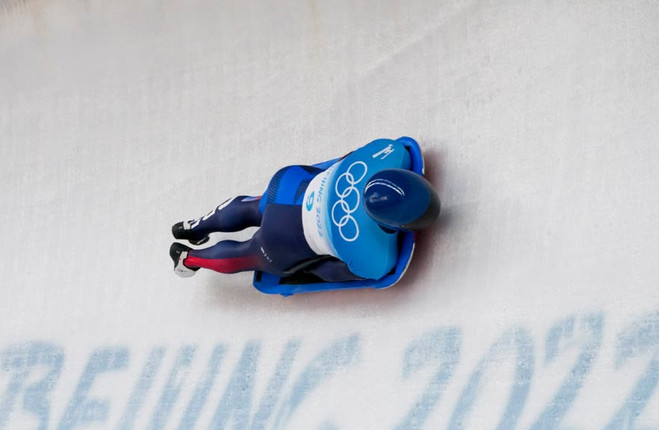British hopes of extending its skeleton medal streak into a sixth Olympics are hanging by a thread after a pair of poor performances in the opening two runs of the men’s event at Yanqing on Thursday.
Matt Weston and Marcus Wyatt sit in 13th and 17th places respectively, well over two seconds adrift of leader Christopher Grotheer from Germany, who holds a considerable 0.7 second advantage over compatriot Axel Jungk.
British skeleton athletes have secured at least one medal at every games since the sport was restored to the Olympic programme in 2002, when Alex Coomber secured a bronze medal in Salt Lake City.
British racers exceeded expectations in Pyeongchang four years ago when Lizzy Yarnold retained her title and was joined on the podium by Laura Deas, while Dominic Parsons was also a surprise bronze medallist in the men’s event.
However, despite almost £6.5million in UK Sport funding for the current Olympic cycle, and a promise of technological innovations which would move them into medal contention, British athletes have struggled to make any impression on the Beijing track.
“I could probably look at about 10 or 12 mistakes that I made and I’m really not happy,” said Weston, who had raised hopes of maintaining the run when he became the first British man to win a World Cup gold medal in Igls in November.
“But at the same time you’ve got to enjoy it. I’m really happy to be at the Olympics competing and representing my country.”
Deas and team-mate Brogan Crowley have barely troubled the top 10 in their six practice runs, and are no longer considered contenders for the women’s event, which is due to start on Friday.
10 Feb -Day 6️⃣#AlpineSkiing - Men's Alpine Combined
— Beijing 2022 (@Beijing2022) February 10, 2022
#Gold JOHANNES STROLZ - AUT
🎉Congratulations!
#Beijing2022 #Olympics #BingDwenDwen#TogetherForASharedFuture
📸GettyImages pic.twitter.com/BUF0bXuvo4
Elsewhere, Austria’s Johannes Strolz bounced back from being dropped from his team to emulate his father in winning Olympic alpine combined gold on Thursday.
Strolz, sitting fourth after the opening downhill, produced the fastest slalom run to clock a combined time of 2min 31.43sec to top the podium just as his father Hubert did at the 1988 Calgary Olympics.
Norway’s Aleksander Aamodt Kilde added silver to his super-G bronze, finishing 0.59sec slower than the winner, with Canada’s James Crawford taking bronze at 0.68sec, a just reward after he finished fourth in the downhill and sixth in the super-G.
The result crowned a remarkable comeback for Strolz, whose poor form on the World Cup circuit led to him being dropped from the demanding Austrian team.
It resulted in the 29-year-old funding his own way on the circuit and working for a time as a traffic cop, but his rise in form was clear for all to see.
-Additional reporting AFP

